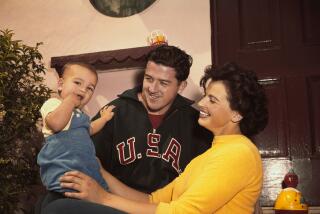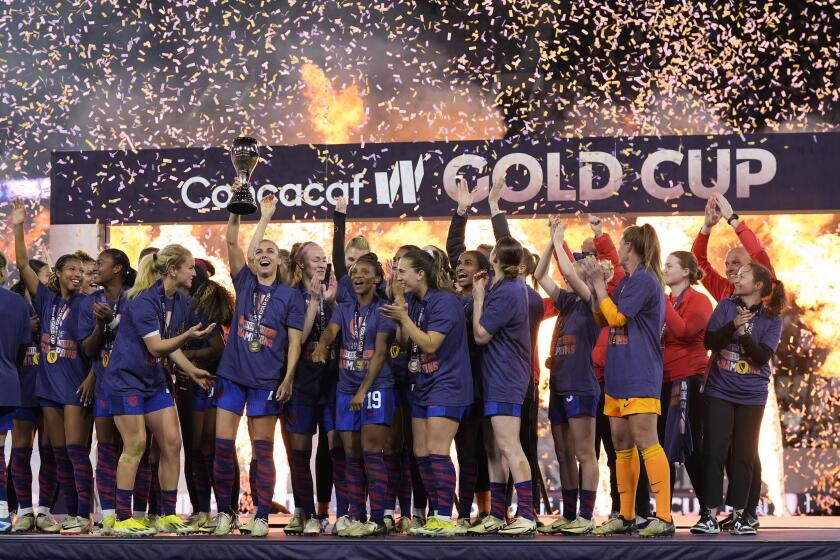Would-be Olympian gets ‘A’ in citizenship
Bruce Kennedy wishes Becky Hammon would have heard his story before deciding to play for the Russian Olympic basketball team.
He says he holds no ill will toward her, nor toward the Clippers’ Chris Kaman, who will play for the German Olympic team.
“On some level, I understand Kaman. He has a connection with a grandparent being German,” Kennedy says. “But, with the young woman, who has no such connection, I just don’t understand.
“She’s a U.S. citizen. You can’t have one foot in the boat and one on the dock.”
With the question of Olympic eligibility having a high profile going into this week’s Beijing Games, because of the prominence of U.S. basketball players, Kennedy’s story is worth resurrecting.
He was born in Rhodesia 57 years ago. His father was a track and field coach. His country, later to become today’s Zimbabwe, was landlocked above South Africa and was separatist in its racial policies.
“We were never like South Africa’s apartheid,” Kennedy says, “but there were policies, wrong ones, where you had to own land to vote. Things like that.”
Kennedy was a javelin thrower, the best his country had, which wouldn’t get you a lot -- certainly not a medal -- in the framework of international competition. For the 1972 Summer Olympics, Kennedy was Rhodesia’s javelin thrower and had already been in Munich, working out with his team for the two weeks, when the International Olympic Committee asked Rhodesia to leave, fearing that a boycott by African countries would disrupt the Games.
“Even back then, as young as I was,” Kennedy says, “part of me understood that the IOC had to act. And why.”
By the 1976 Games in Montreal, Kennedy had come to the United States, been a member of Cal’s track and field team, graduated and married his now wife of 34 years, Barbara. She was from Los Gatos and they met at Cal.
Kennedy was still a Rhodesian citizen and still their best javelin thrower, so, once again, he was on Rhodesia’s Olympic team. And, once again, the threat of boycott by African countries kept him and his country out of the Games.
“This time, we didn’t even go to Montreal,” he says. “There was no chance we’d compete.”
In 1977, Kennedy became a citizen of the United States and also won a national title in the javelin.
“There was no greater thrill than putting on a U.S. uniform for the first time,” he says.
By 1980, new U.S. citizen Bruce Kennedy was among the top 10 javelin throwers in the world. He had progressed little at Cal but had gone to train in Houston, under famed coach Tom Tellez, had improved his distance by an incredible 20 feet and finished second that spring in the U.S. Olympic trials.
He was on his third Olympic team, first for the U.S. And, of course, what happened next was that Jimmy Carter and the U.S. government decided to boycott the Games as a protest of Soviet aggression in Afghanistan.
“Yup, that made me a three-time loser,” Kennedy says, laughing.
But, unlike many from that 1980 U.S. Olympic group, Kennedy is not bitter. As he did in ‘72, and ‘76, he says he understood about ’80. His message of understanding might have been valuable to Hammon.
“We are Americans first, athletes second,” he says. “We have a privilege and a responsibility that comes with our citizenship. That responsibility is to accept the judgment of our government.”
The final chapter of Kennedy’s story is most revealing.
In 1980, he had a personal best throw of 287 feet. The gold medal was won at the Moscow Games with 299 feet. He could have competed for Rhodesia just by asking to be included on the team. He very likely would have won a medal.
“I never thought about competing,” he says. “I was an American now.
“The interesting thing is, my dad never even raised the topic, either.”
Kennedy lives in Santa Barbara, is a financial advisor with two college-age children, a daughter at Penn and a son at Cal. Both throw the javelin.
He says he is proud of the statements he reads from the U.S. men’s basketball team, their voicing of an understanding of what it means to represent their country on this largest of international stages.
And he says he doesn’t want to come down hard on Hammon, but he just doesn’t understand her thought process, even with the reported sizable sum she is being paid by Russia.
“I read about the $2 million,” Kennedy says, “and I understand the financial stuff. But that doesn’t give her the right to the Olympics. You earn your way to the Olympics. It is an honor to represent your country. To go and compete for another country is, to me, inexplicable.
“It doesn’t matter how good an athlete is. There is no moral justification for putting on a uniform of convenience. . . . It is an honor to represent your country. Athletic mercenaries don’t have any honor.”
That’s Bruce Kennedy’s story. It will be, in the view of many, old-school, out-of-touch, even naively nationalistic.
In the view of others, it stands as a breath of fresh air and a much-needed line drawn in the sand.
--
Bill Dwyre can be reached at bill.dwyre@latimes.com. To read previous columns by Dwyre, go to bill.dwyre@latimes.com.
More to Read
Go beyond the scoreboard
Get the latest on L.A.'s teams in the daily Sports Report newsletter.
You may occasionally receive promotional content from the Los Angeles Times.





